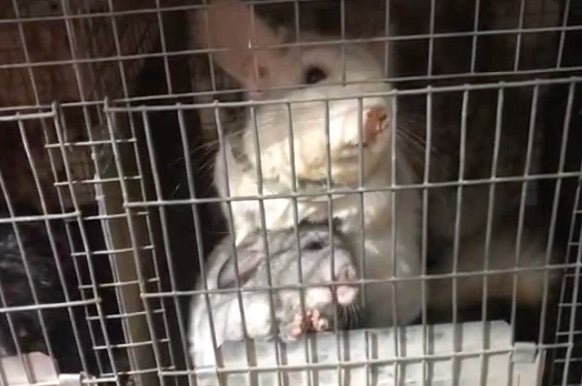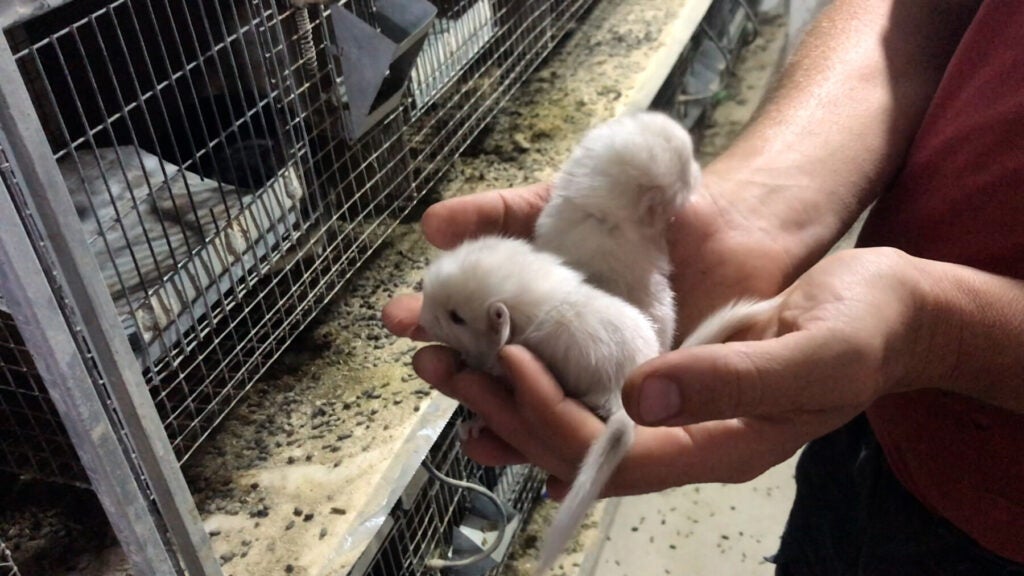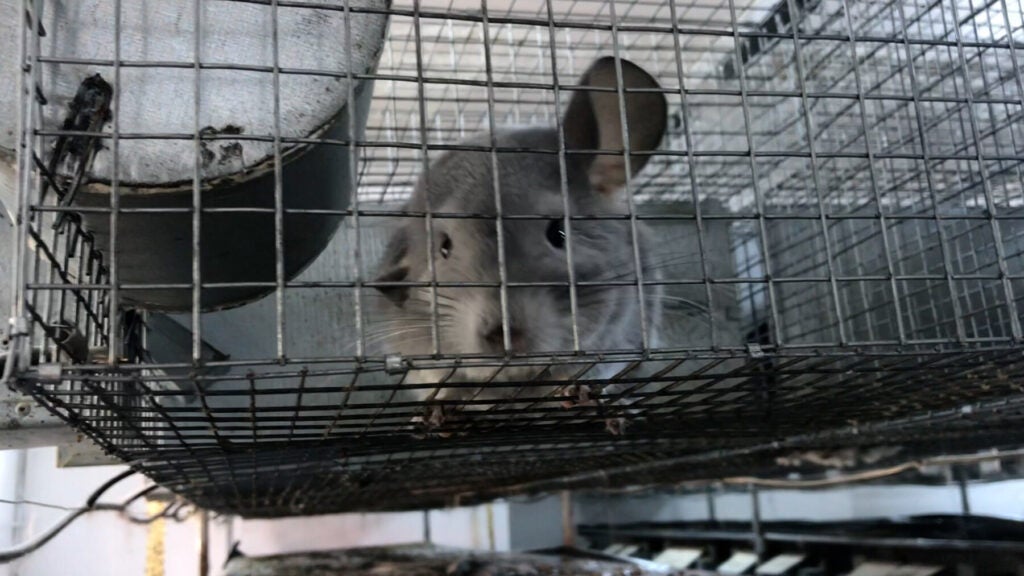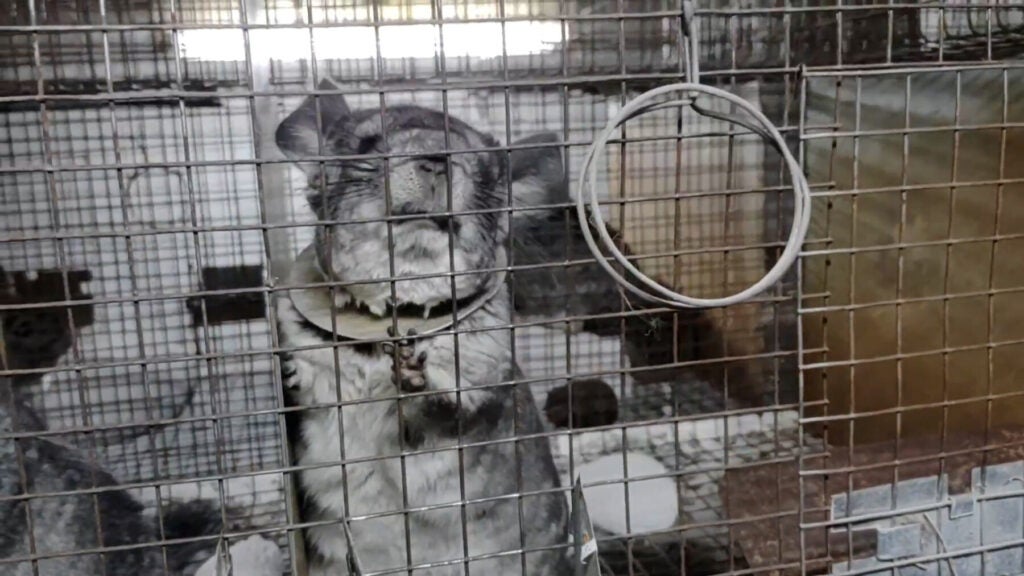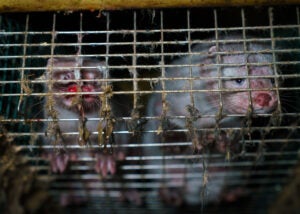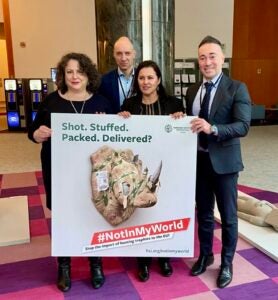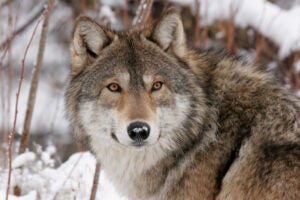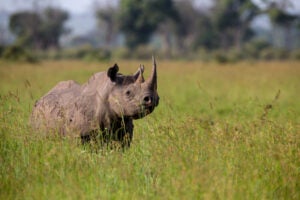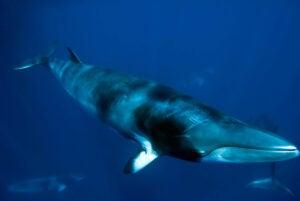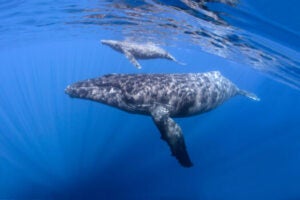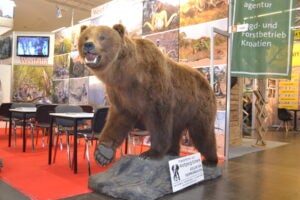
BRUSSELS—From 24 to 29 January, Europe’s largest hunting fair will take place in Dortmund, Germany. Over 80 national and international exhibitors from Canada, Argentina, Namibia, South Africa, Germany, Spain, Poland and others, will attend Jagd & Hund 2023, offering trophy hunting trips, that cost between a few hundred and tens of thousands of euros, around the world to kill elephants, big cats, rhinos, polar bears and numerous other iconic species. In a joint letter with 30 organizations, Humane Society International/Europe called on Mayor Thomas Westphal and the Dortmund City Council to stop the selling of trophy hunting trips in the Westfalenhallen, the location for the fair.
For years, Humane Society International has been raising the alarm over the impacts that hunting fairs offering trophy hunts like Jagd & Hund have on wildlife product demand, animal welfare and biological diversity. Between 2014 and 2020, trophies of 5,409 animals of internationally protected species were imported into Germany, including 194 leopards, 208 brown bears, 166 hippos 229 elephants, 138 lions, nine polar bears and two black rhinos. Many of these animals were killed because of the hunts sold at hunting fairs such as the Jagd & Hund. It is time for industry and governments—from city councils up through national and international offices—to end their support of trophy hunting.
Sylvie Kremerskothen Gleason, country director of HSI/Europe in Germany, says: “It is not acceptable that in 2023 trophy hunting outfitters are still legally selling trips to shoot protected species for fun and games at a fair in Germany. For years we have been urging the responsible authorities in Dortmund to exclude these offers – but they keep silent and in doing so, support this gruesome industry that adds an additional danger to the survival of species that are already struggling to survive. It is long overdue that a stand is taken against trophy hunting of imperiled species.”
Dr. Jane Goodall DBE, founder of the Jane Goodall Institute and UN peace ambassador, is also appealing to those responsible: “The fact that hunting trophies of rare and endangered species are still legal is absolutely shocking! Please stop the sale of organized trophy hunting trips in the context of the ‘Jagd & Hund’ fair in Dortmund. Support thereby the animal and species protection!”
The Wildlife Animal Protection Forum South Africa—a coalition of non-governmental organizations in South Africa, which is a significant range state for many hunted species—also spoke out against the hunting fair and wrote an open letter to the Mayor of Dortmund. The letter was signed by more than 90 supportive organisations mainly from South Africa, including members of forum and of the Pro Elephant Network and was endorsed by world renowned wildlife conservationists, wildlife veterinarians, international dignitaries, politicians and environmental lawyers.
Trophy hunting is a form of entertainment rooted in wealth and pageantry that results in both severe cases of animal harm and far reaching damaging biological and ecological impacts. Yet, more than 120,000 animals are killed in Africa each year by big game hunters. The EU is the second largest importer of hunting trophies from internationally protected species, behind the United States. Germany is by far the greatest importer within the EU.
HSI/Europe is particularly concerned about the trophy hunting industry’s promotion of inhumane killing methods advertised at the Jagd & Hund fair and has already identified multiple travel offers for hunts being sold at the fair that promote hunting methods banned in Germany because of their inhumane nature, such as bow hunting. It also appears that many vendors are already in violation of exhibition regulations for the fair which clearly state that the marketing of “shooting opportunities” is forbidden for bred animals as well as for animals who are kept in closed areas—called canned or captive hunting. However, vendors were identified that advertise canned hunting trips for sale ahead of the fair.
Trophy hunting undermines international efforts to protect imperiled species, drives global demand for animal parts and products, and calls into question ethics around sport hunting as a form of sustainable use, as highlighted in a letter sent to the German Government by the IUCN Ethics Specialist Group calling for an end to German imports of hunting trophies from regulated species. In the 2020 election campaign, Mayor Westphal promised, if he took office, to set up an ethics committee to objectively examine the issue of trophy hunting and the corresponding marketing at the fair. To date, this ethics commission has not been appointed.
Trophy hunts allowed at fair despite overwhelming public opposition:
Despite overwhelming public opposition to trophy hunting—including from the majority of Germans—Dortmund’s government and exhibition centers have continued to facilitate the slaughter of thousands of animals by allowing these fairs to continue year after year. Opinion polls show that the vast majority of EU citizens (over 80%) oppose trophy hunting and want to end trophy imports. In South Africa, one of the most popular destinations for German hunting tourists, 68% of the respondents across all social backgrounds reject trophy hunting.
Many governments and industry leaders are already taking action to end their involvement in the trophy hunting industry. Some of the world’s largest travel providers, including Booking.com, TripAdvisor and Expedia Group, called on the South African government to end trophy hunting and focus on a wildlife-friendly future. There are also more than 170 NGOs from around the world calling for an end to trophy hunting, and the European Parliament recently positioned itself in favor of an EU-wide ban on the import of hunting trophies. The Netherlands, Finland and France already ban the import of hunting trophies of certain species. The UK, Belgium, Italy, Spain and Poland are also discussing this. In addition, Germany withdrew from the International Hunting Council CIC at the turn of the year. The Westfallenhallen should take note that in Italy, the IEG Italian Exhibition Group SpA recently cancelled their country’s largest hunting fair, highlighting its conflict with the company’s ecological values.
ENDS
Media contact: Adeline Fischer, senior communications manager for HSI/Europe: afischer@hsi.org; +49 17631063219

